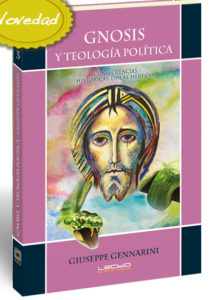
Did you know that Giuseppe Gennarini, the Neocatechumenal Super-Catechist, wrote a book based upon lectures he gave at our very own Redemptoris Mater Seminary in Guam? How exciting!
Gennarini’s book, “Gnosis y Teologia Politica,” (“Gnosis and Political Theology”) is written in Spanish, even if his original lectures at the seminary were delivered in English.
While there are undoubtedly many things we will eventually share from Gennarini’s new book, today we’ll just discuss his Marxist background. While he may have abandoned Marxist materialism, Gennarini’s actions on Guam show that he certainly has not abandoned his Marxist methods, machinations, and manipulations…
Here is an excerpt from the book about that part of his life:
Before starting the course, I will briefly introduce myself. I grew up in Rome in a very Catholic family. I studied at the Istituto Torquato Tasso, which was considered the best in town: you had to study a lot. There was a very high number of students leaving: we began 35 in the first year, and in the fifth year (we had five years of high school), we were 12. The school was a pilot project of the Communist Party and had a high academic level.
[Antonio] Gramsci was an Italian intellectual who defended a certain interpretation of Marxism, the idea of cultural hegemony: that is, that to gain power, you first have to get control of the culture of society. The way to dominate a society is not through military power, violence, or the revolution, but by controlling its cultural institutions and ultimately their culture.
Antonio Gramsci developed an interpretation of the literature, of music and the art applying a Marxist perspective: Dante, Shakespeare, all through a Marxist interpretation. In fact, Gramsci’s project obtained, little by little, through the Communist Party, a cultural hegemony in ltaly that still persists.
At my school all principal teachers were communists, but they were very good teachers, and you really had to study. We did study Greek hard, so that, when we finished our last exam, we read The Iliad, The Odyssey, Plato’s dialogues in Greek; the professor pointed his finger and said: “Translate here.”
When I finished high school, I went to study philosophy at the Sapienza University of Rome, whose faculty of history and philosophy teachers were made up of a largely Marxist majority.
Mainly we studied Hegel and Marx, for without Hegel you cannot understand Marx. Without Kant, you can not understand Hegel, without Hume can not understand Kant. And so I began returning to philosophy. We had a pre-Socratic terrific philosophy professor who was also a Communist.
At the University of Rome, Faculty of History, Literature and Philosophy, the interpretation of philosophy, of Italian literature, Latin literature, Greek literature, the interpretation of history … are all contemplated under a Marxist perspective.
Thus, everyone was indoctrinated; I was also indoctrinated and I became a Marxist. I began to study Hegel and Marx for four years.
When you read Hegel, it sounds like Arabic; you need to decode it, to decipher it. For example, when Hegel speaks of the spirit, that the spirit comes out of himself, and then returns to itself … if you can decipher it, you understand that he is talking of Napoleon, who at that moment in history for Hegel was the incarnation of absolute spirit. He does not explicitly speak of Napoleon, but he does speak of Napoleon, albeit in a way that makes no direct reference to Napoleon for it to be possible to deduce that speaks of him.
So I started to do a thesis on Marx, on the concept of man according to Marx… Gnosis y Teologia Politica, pp 27-29, (translated from the original Spanish)
According to an introduction to the book written by University of Guam Professor David Atienza de Frutos, this book “is the result of an oral seminar, conducted at the Institute Blessed Diego Luis de San Vitores Catholic Theological Institute for Oceania on the island of Guam, where future priests for the Pacific Islands and for the new evangelization are formed.” [p. 21].
tags: Neocatechumenal Way
